Захист навколишнього середовища
Фрагмент уроку з використанням проектної технології, 10 клас
(урок узагальнення і систематизації вивченого матеріалу)
Subject: Environmental Problems
Type of Lesson: knowledge systematization and generalization
Method: project
Course Book: Enterprise 3, Pre - Intermediate, Express Publishing
Equipment: slides, multimedia screen, computer, printed report.
The Teaching Aims:
1. Focus on the environment and ecology problems;
2. Develop listening comprehension skills by gaining for specific and general information;
3. Improve speaking skills by making a ‘round table’ dialogue and using the ideas presented in the listening.
The Educational Aims:
- Provide the system of norms and rules of ecologically competent behavior and activity of the person in natural and social environment;
- Develop the students’ needs to communicate with nature, inspiring the activities in nature protection.
Procedure of the Conference:
- Identify ecological problems;
- Introducing the student’s report on the urgent theme;
- Listening for specific points of the reporter;
- Discussing causes, results and suggested ways for human beings to make our precious planet more environmentally friendly.
Procedure of the Lesson
- Preliminaries of the Lesson.
Greeting. Reporting the subject and objectives of the lesson.
- Introduction.
a) T: Students, tell me please, what issues the society face to in the world.
S1: Large cities with thousands of smoky industrial enterprises appear all over the world today. The byproducts of their activity pollute the air we breathe, the water we drink, the land we grow grain and vegetables on.
S2: Every year world industry pollutes the atmosphere with about 1000 million tons of dust and other harmful substances. Many cities suffer from smog. Vast forests are cut and burn in fire. Their disappearance upsets the oxygen balance. As a result some rare species of animals, birds, fish and plants disappear forever, a number of rivers and lakes dry up.
S3: The pollution of air and the world's ocean, destruction of the ozone layer is the result of man's careless interaction with nature, a sign of the ecological crises.
S4: The most horrible ecological disaster befell Ukraine and its people after the Chernobyl tragedy in April 1986. About 18 percent of the territory of Belarus was also polluted with radioactive substances. A great damage has been done to the agriculture, forests and people's health. The consequences of this explosion at the atomic power-station are tragic for the Ukrainian, Byelorussian and other nations.
S5: Environmental protection is of a universal concern. That is why serious measures to create a system of ecological security should be taken.
T: You are exactly right! I propose you to revise and discuss the principal problems people should be aware of. Today, you are to be proposed to name not only the environmental problem, but reveal the ways of its solution.
The Points of the Debating are:
- Air pollution;
- Water contamination;
- Deforestation;
- Littering;
- Illegal hunting;
- Urban sprawl;
- Disappearing natural recourses;
- Nuclear power stations;
- Acid rain;
10. The green house effect;
- Brainstorm activity.
T: - Students, I suppose you will agree with me that the solution of any problem begins with each of us. So, I wonder how environmentally friendly you are. Answer the questionnaire, then count the results and find out how environmentally aware you are.
How environmentally aware are you?
|
1. What does your family do with empty bottles? A take them to a recycling bin В return them to the supermarket С throw them in the rubbish bin 2. When you buy one or two items at the supermarket, you A take a plastic carrier bag. В reuse an old plastic earner bag. С use your own bag. 3 How often do you choose products which contain recycled materials? A always В never С sometimes 4 If you were asked to contribute to a Save the Animals project, you would A give generously. В give a small amount. С refuse to give anything.
|
5. A local beach has been polluted with oil. You A donate money for the clean-up project. B do nothing C volunteer to help with the clean-up project. 6. You eat a chocolate bar in the street. What do you do with the wrapper? A drop it on the pavement В put it in a litter bin С save it for recycling 7. When you buy paper products, you A buy whatever is cheapest. В try to purchase recycled paper С purchase recycled paper as long as it doesn't cost more. 8. When you clean your teeth you A turn the tap on only when you need water. В leave the tap running until you have finished. С only use one glass of water. |
1 A 3 B 2 C 0 2 A 0 B 2 C 3 3 A 3 B 0 C 2 4 A 3 B 2 C 0 5 A 2 B 0 C 3 6 A 0 B 2 C 3 7 A 0 B 3 C 2 8 A 2 B 0 C 3
18-24 Keep up the good work! You are doing your part to protect the environment. 13-17 There`s some room for improvement. Change your habits and you`ll soon be green. 0-12 You are part of the problem. You should try to become part of the solution
|
|
(T: I believe you are absolutely friendly to nature) |
|
|
- The Main Part of the Lesson
Language Development
a) Link the following sentences with: as a result, therefore, consequently or as a consequence to extend them in giving effects.
1. Trees are being cut down. Many species will become extinct.
2. People in cities breathe exhaust fumes every day. Many of them develop breathing problems.
3. Industrial waste is dumped into the sea. Fish die.
4. People drop litter in the streets. People get diseases.
5. Most factories do not use filters. The air gets dirty.
b) Now join the sentences using to or so that.
1. We should stop cutting down trees. Animals won't lose their natural habitats.
2. We should build wildlife parks. We can protect animals from extinction.
3. We should plant more trees. We will have more oxygen.
4. We should clean up the litter in cities. We won't catch diseases from it.
5. We should find clean forms of energy. We can save the planet.
c) Look at the boxes and match the suggestions with
their results. Then, link the sentences with( so that/ to) to talk about how we can improve the living conditions in our cities.
SUGGESTIONS
1. Governments should improve public transport.
2. People should get involved in recycling schemes.
3. We should ban cars from city centers.
4. Governments should force factories to put filters on chimneys.
5. We should stop using the products of companies whose factories cause pollution.
RESULTS
a There will be less rubbish to pollute the environment.
b We will force them to use environmentally friendly production
methods.
с We can make the streets cleaner, safer and quieter.
d People won't have to use cars to get around.
e The harmful gases won't be able to pollute the atmosphere.
Speaking Development
Listening Comprehension Activity
a) Read the table, then listen to the tape recorder and fill in the missing information. Then be ready to discuss the problems, their causes, effects and try to express the real ways of solution.
(Students use the linking words, such as: as a result, consequently, therefore, as a consequence, yet, moreover, fortunately, unfortunately, furthermore, however, luckily, on the other hand, on the positive side, in conclusion, what is more, in addition, so that, because of, first of all, to sum up etc.)
|
Problems |
Causes |
Effects |
Solutions |
|
Litter/rubbish |
|
Dirty streets, spread of diseases |
Encourage recycling, use litter bins |
|
Air pollution |
Factories and plants, traffic fumes pollute the atmosphere |
|
Unleaded petrol, filters in factories, ban cars from city |
|
Water contamination |
|
Fish die, stomach diseases |
Limit use of chemicals in industry, fine enterprises which damp seas/ rivers |
|
Deforestation |
People cut down trees |
Birds and animals lose homes and die, rare species of them are threatened with extinction |
|
|
Acid rains |
Chemicals from aerosols sprays and fridges are going up into the atmosphere |
People get skin cancer |
|
b) Compare and contrast the pictures, commenting on the damage humanity has caused to our planet. Say, what measures should be done to avoid it.
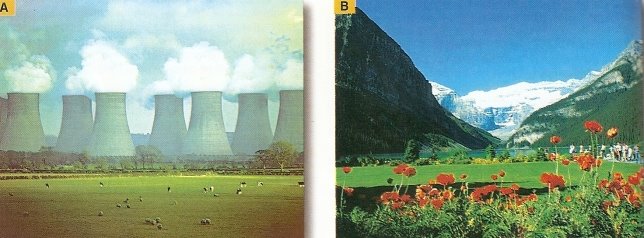
Projects’ Presentation.
(The students sum up the information and present their projects on the above-mentioned environmental problems)
S1: One of the major problems is the destruction of the rainforests. They clean the air by absorbing carbon dioxide and giving out oxygen. As a result, animals lose their homes and die. It can cause changes in the climate, air pollution, flooding, drought and famine…..
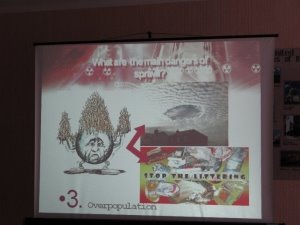
S2: Another big problem is water contamination. Factories are polluting rivers and lakes with dangerous chemicals. As a result, fish are dying….
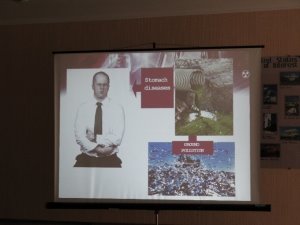
S3: Air pollution is another important issue. The cars and factories in and around our cities are giving off dangerous fumes…..
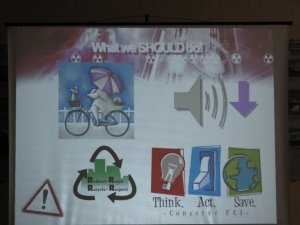
S4: The problem of endangered species is caused by growing cities and countryside disappearing. The WWF should stop illegal hunting as well…..
S5: The problem of litter is caused by the production too much packaging and food waste. As a result, diseases are spreading more easily. ……..
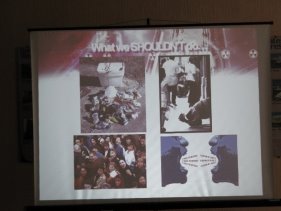
- Making Conclusions.
T: Summing up: (the students express their own ideas on what should be done to prevent an ecological disaster)
Students’ ideas:
- to raise safety standards at all industrial facilities to adequately process by-products of industry;
- to set up an international space laboratory to monitor the state of environment;
- to set up an international center for emergency environmental assistance;
- recycling is the best way to reduce waste;
- purifying systems for cleaning and trapping harmful substances must be widely used;
- pollution control systems must be introduced;
- green zones must be created;
- enterprises must be removed from cities;
- to ban disposal of toxic and nuclear wastes;
- to raise money to save animals from extinction;
- to stop using aerosols to avoid destruction of the ozone layer;
- to invest money in creating electric cars;
- to encourage authorities to establish more protected national parks;
- to introduce harsher punishments for illegal hunters and poachers;
- to lessen the demand for animals’ fur, skin, horns, tusks;
- to stop wasting and polluting water;
- to state birth control;
- to limit deforestation;
- to support “Green Volunteer” program;
- to raise public awareness about environment protection;
- to prevent littering and rubbish tips;
- to force power stations to release of poisonous fumes.
- Making conclusion:
- Students say what they have leant at the lesson;
- Teacher is summing up the students’ work, giving assessments.
5. Home task.
Try to imagine you are a representative of local authorities. Be ready to take part on TV Debates with some conservationists on the Ecological Issues.
(Subject of discussion: «How to make our city a better place to live? »)


про публікацію авторської розробки
Додати розробку
